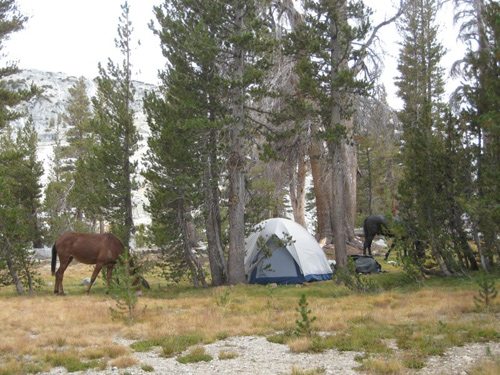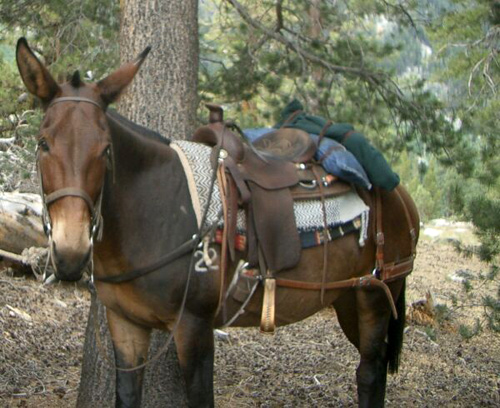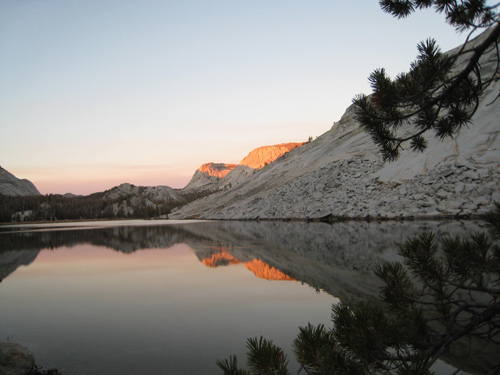Yosemite Expedition
California USA: (RTCA07)
URL: https://www.hiddentrails.com/tour/ca_yosemite_expedition.aspx
Introduction
California
USA
Explore over 100 miles of the John Muir-Pacific Crest Trail through wildflower- blanketed valleys, alpine lakes and forested campsites. Opportunity for Golden, Rainbow and Brook trout fishing. The wildlife, glaciers and majestic peaks over 13,000 feet made this John Muir’s favorite backcountry – his “range of light”. We will ride over Mono Pass and join the John Muir Trail before crossing Silver Pass. Continuing on past countless lakes, we visit Cascade Valley and Iva Belle Hot Springs. We ride through the Ansel Adams Wilderness. Journey past Mt. Ritter and Mt. Banner before climbing to Donohue Pass, the entrance to Yosemite National Park. Our last camp is in the Lyell Canyon. We explore what some call the most majestic meadows in the Sierra in our last day’s ride.
Accomodation

Accommodation
This is a pack trip and all nights are spent camping.
Description
We have a wide variety of tents available (single, double, or family), so please let us know what type you prefer if you have not already. There is a solar shower and privy with toilet seat and tent at the campsites. There is no generator on our trips -- no electrical source is available.
We do not provide ground mats or sleeping bags, so you must bring your own!
Camping Itinerary
Night 1: Third Recess and Mono Creek Camp
Night 2: Silver Pass Meadow Camp
Night 3 & 4: Horse Heaven Camp
Night 5: Deer Creek Camp
Night 6: Gladys lake Camp
Night 7: Thousand Island Lake Camp
Night 8 & 9: Lyell Fork Canyon Camp

Meals
All meals are included from breakfast on Day 1 to lunch on the last day.
Food is typically sourced from local establishments. We strive to provide a deluxe dining experience and tailor our menus to reflect the tastes of our guests.
We prepare breakfast and dinner. A hot breakfast is prepared fresh each morning. Fresh fruits, vegetables, and salads are available at lunch and dinner each day.
Lunch is a build-your-own affair, typically completed before breakfast is served. Sandwich makings, fruits, and snacks are available for you to create your own take-along meal.
Each dinner has a different entrée (beef, chicken, pork, etc).
Alcohol is not included in this trip, but guests are free to bring their own.
Dietary Restrictions
We can cater to vegetarians with prior notice.
This trip includes
and can accommodate special dietary requests.
Riding

Pace
Riding experience is considered when fitting you for a mount. There are plenty of horses and mules to choose from to fit your expertise. All trips go at a walk. Our crew will help you get comfortable before we leave the pack station. We ride as few as 2 hours or as many as 6 hours in a day.
Horses
Approximately 130 horses and mules are the backbone of the operation. Pack mules carry the provisions for trail riders, hikers, and those wishing to have their gear packed to a wilderness campsite. Mules typically carry 150-240 pounds of equipment, food and dunnage and work from June through September. During the off season, livestock graze fields in the Owens Valley.
Horses and mules come to the pack station as four to five year old green broke. After a couple of years of training they spend up to another twenty to twenty-five years working in the Sierra.
Tack
You are encouraged to bring your own saddle if you have one. However, if your tack doesn't fit our stock, or we deem is unsafe, you will not be able to use it.
Guides
Each year young men and women bring youth and enthusiasm to a crew of senior packers and cooks. Most of the crew come from ranch backgrounds and once they start packing with us, they have a hard time ever leaving. Every member of the crew carries on the traditions of the talented men and women who started the business in the 1940s. New employees learn the trails, traditions, and develop skills to serve another generation of guests. Only the most able, hard working and those with exceptional people skills succeed as staff.

Itinerary

Sample Itinerary: *subject to changes
Day 1: Rock Creek to Third Recess and Mono Creek
Leaving the Pack Station (10,000ft.), the route follows the Mono Pass Trail, which ascends Mt. Starr to Mono Pass (12,000ft). Enjoy the views of Little Lakes Valley framed by Mt. Morgan (13,748), Bear Creek Spire (13,601), Mt. Dade (13,601), Mt. Mills (13,468) and Mt. Abbott (13,715). After crossing the pass, enjoy unrestricted views of Pioneer and Hopkins Basins. Riders descend past Trail Lake before coming to Gold Creek. Riders go alongside Gold Creek and Mono Creek to reach camp down the canyon.
Estimated riding time: 5 hours
Meals included: Breakfast, Lunch & Dinner
Camp near the confluence of Third Recess and Mono Creek
Day 2: Mono Creek to Silver Pass Meadow
Riding down canyon, riders pass through several life zones with groves of fir, Jeffrey, Juniper and Lodgepole Pines, interrupted by meadows and ridges of flowers. After several hours, turn north on the John Muir Trail (Pacific Crest Trail) to climb towards Silver Pass. The trail skirts the edge of Pocket Meadow before heading up beneath the waterfall of the North Fork of Mono Creek. Camp is in a secluded meadow with spectacular views of the mountain ranges to the south.
Estimated riding time 4.5 hours
Meals included: Breakfast, Lunch & Dinner
Camp at Silver Pass Meadow
Day 3: Silver Pass Meadow to Cascade Valley
Continue north on the Muir Trail past Silver Pass Lake to reach Silver Pass. (10,900). To the south, view Seven Gables Mt. (13,075) – a grand peak overlooking Bear Creek. To the northwest, see Mt. Ritter and Banner Peak and the edge of Yosemite. Descend to the head of Cascade Valley after passing the five lakes in the basin of the Lone Indian. Riders descend to Cascade Valley alongside of Fish Creek.
Estimated riding time 5 hours
Meals included: Breakfast, Lunch & Dinner
Camp at Horse Heaven
Day 4: Layover
A good day to rest and fish or take a day ride up the Minnow Creek Trail to Grassy Lake.
Meals included: Breakfast, Lunch & Dinner
Camp at Horse Heaven
Day 5: Cascade Valley to Iva Belle Hot Springs
The riders head down Fish Creek and make camp at the Iva Belle Hot Springs.
Estimate riding time: 2.5 hours
Meals included: Breakfast, Lunch & Dinner
Camp at Iva Belle Hot Springs
Day 6: Iva Belle to Cold Creek
Ride through Fish Valley and cross the river at Island Crossing. Climb up the Fish Creek trail to a camp on Cold Creek. (8 miles)
Estimated riding time: 3.5 hours
Meals included: Breakfast, Lunch & Dinner
Camp at Cold Creek
Day 7: Cold Creek to Johnston Lake
The group heads a few miles up to Red’s Meadow before climbing up the John Muir Trail to Johnston Lake. (9 miles).
Estimated riding time: 4.5 hours
Meals included: Breakfast, Lunch & Dinner
Camp at Johnston Lake
Day 8: Johnston Lake to Thousand Island
Riders pass Rosalie Lake, Shadow and Garnet Lake on this ride beneath the Minarets. This is the most spectacular part of the Ansel Adams beneath Ritter, Banner and The Minarets. We make camp on the northwest side of Thousand Island Lake (9,850). (12 miles)
Estimated riding time: 5 hours
Meals included: Breakfast, Lunch & Dinner
Camp at Thousand Island
Day 9: Thousand Island Lake to Lyell Fork Canyon
Riders head north over Island Pass to the Rush Creek drainage and exit the eastern side of the Sierra with a climb to Donohue Pass (11,152 ft). This marks the entrance to Yosemite National Park. The views of Mt. Lyell and its glacier are in view as we descend to expansive meadows in Lyell Fork Canyon. (13 miles)
Estimated riding time: 5 hours
Meals included: Breakfast, Lunch & Dinner
Camp at Lyell Fork Canyon
Day 10: Layover in Lyell Fork Canyon
The day ride will go up to explore the Vogelsang area of Yosemite. Lake Ireland, Evelyn Lake and the Vogelsang High Sierra Camp are amongst the choices riders have in exploring this alpine area. Or, wander through the meadows and enjoy a day of leisure before heading home.
Meals included: Breakfast, Lunch & Dinner
Camp at Lyell Fork Canyon
Day 11: Lyell Fork Canyon to Tuolomne Meadows
We ride north through large meadows to end the trip at one of the most spectacular large meadows in the Sierra.
Estimated riding time: 3.5 hours
Meals included: Breakfast & Lunch

Note: This tour is operating under permit with the USDA Forest Service through Special Use Permit on the Inyo National Forest.
Rates and Dates for Yosemite Expedition
Rates include:
Tent accommodations, All meals & 10 guided riding days
Saddle bag are provided
Tax 1: 3 %
Tax 2: 8 %
Rates Note:
3% charge for USFS fee
8% charge for regulatory taxes
$10 Wilderness Permit Fee (mandatory)
* prices are per person based on double/twin occupancy
Tax: 3 %
additional Tax: 8 %
Rates Note:
3% charge for USFS fee
8% charge for regulatory taxes
$10 Wilderness Permit Fee (mandatory)
Transfer and Other Charges:
|
2020
|
Meet at 7:00am on Day 1 at the pack station
|
Dates Note:
Rates do not include:
Sleeping bag and mat, Alcoholic drinks, Transfers, Gratuities & Taxes
Other Info
Meeting: Pack station
Airport: Mammoth Yosemite Airport (MMH)
Transfer: --
Climate:
Mammoth Lakes area
|
Month
|
Jan
|
Feb
|
Mar
|
Apr
|
May
|
Jun
|
Jul
|
Aug
|
Sep
|
Oct
|
Nov
|
Dec
|
|
Average High Temperature (°F)
|
41
|
41
|
46
|
50
|
53
|
70
|
78
|
77
|
71
|
60
|
49
|
41
|
|
Average Low Temperature (°F)
|
16
|
17
|
22
|
26
|
33
|
41
|
48
|
46
|
39
|
30
|
23
|
17
|
|
Average High Temperature (°C)
|
5
|
5
|
8
|
10
|
16
|
21
|
26
|
25
|
22
|
16
|
9
|
5
|
|
Average Low Temperature (°C)
|
-9
|
-8
|
-6
|
-3
|
1
|
5
|
9
|
8
|
4
|
-1
|
-5
|
-8
|
|
Average Precipitation (days of rain)
|
7
|
7
|
6
|
5
|
3
|
1
|
2
|
1
|
1
|
3
|
4
|
7
|
Source: NOAA
Seasons
Weather in the mountains can change rapidly during all seasons of the year. You should be prepared for ALL types of weather year round! And keep in mind that it can get quite cold at night, even when hot in the day time! Even in May and into the beginning of June, it can get down to 45-50° F at night, while in the daytime it can reach 70-80° F and be very beautiful and sunny!
The elevation plays a major role in temperature and precipitation. Sierra summers are typically warm and dry. However, clouds can build up during the summer to produce spectacular thunderstorm activity! July and August are normally the warmest months.
What To Bring:
Information on What to Pack
Dunnage limit is 30 lbs. per person (this includes sleeping bags,liquor, etc.). There will be a surcharge of $3 to $10 per pound on dunnage in excess of the 30 lbs. Bring personal belongings in stout canvas or nylon duffels, ideal size approximately 14" x 32". It is a good idea to use a large plastic bag INSIDE of the duffle to protect contents from external moisture. Sleeping bags can be in separate duffels. Attach name to dunnage, camera, canteen, etc. Tent provided, however, you may bring your own private tent if under 10 pounds, which is not included in 40lbs weight limit.
You provide your own alcoholic beverages (if desired). When possible, it is a good idea to transfer alcoholic beverages to sturdy plastic bottles with well fitting caps - it will save weight and protect against breakage. Place all cosmetics, soaps, medications, etc into small plastic containers with close-fitting caps, THEN into sturdy resealable plastic storage bags. If anything breaks or bursts from altitude changes, the plastic bag will contain the spill.
You will be given a small saddle bag that goes on your saddle horn to carry your lunch and a few personal items. (Weight limit 3 lbs - including lunch). Please do not bring your own saddlebag unless it is pocket size. We have helmets to borrow. Please let us know at time of booking.
Remember - try to minimize the weight of your dunnage by packaging only the amount of any item you will need (like soaps, lotions, and medications).
Recommended Items
- Sleeping bag with a comfort range of 20 to 60 degrees and a moisture proof ground cloth.
- Air mattress or small 1/4"-1/2" foam hip pad recommended - your night's rest will affect your next days enjoyment. Bring the best sleeping pad you can manage.
- Broad-brimmed hat is essential for protection from sun at high altitude. It must have strings to keep from blowing off.
- Sunglasses (RX glasses) - high altitude sun is BRIGHT!
- Coffee mug (plastic for camp)
- Pint water bottle for your horn bag
- Pocket knife or small multi-tool
- Flashlight and extra batteries
- Camera and film (sturdy strap)-- if using digital - don't forget an extra battery and card
- Rain jackets and pants or slicker (rolled up you can tie them to the back of your saddle)
- Hat protector (to keep your hat dry)
- Light jacket (windbreaker)
- Wool or fleece pullover/sweater (layers will keep you comfortable)
- Heavy jacket
- Bandana
- Woolen cap (evenings can be cold)
- Gloves (recommend gloves for riding, you may want warm gloves for evenings)
- Socks
- Riding boots
- Shoes for camp (moccasins, athletic shoes, etc)
- Shirts and pants (long sleeved shirts offer sun, bug and branch protection)
- Underwear
- Bathing suit
- Bath towel/wash cloth/soap (try a multi-use bar or liquid for use on hair, body and laundry. Biodegradable choices are available.)
- Insect repellent such as Cutters
- Toothbrush/toothpaste
- Comb/brush clips/pins/ponytail holders
- Shaving kit (a small mirror is helpful)
- Sun Screen (lotion, cream or stick)- use liberally for sunburn and chapping prevention.
- Chapstick with sun protection SPF 15 or better
- Moisturizer (cream or lotion - altitude and sun can be dry and chap skin)
- Prescription medicine (if required - if you have any allergies, remember to bring appropriate medication)
- Band-aids, aspirin, ibuprofen, eye drops, moleskin for any blisters
- Baby powder/Talcum powder (helps to relieve any raw or irritated areas from boots, clothes or saddles)
- Kleenex
- Jogging suit (sweats are comfortable for after-swim and campfire lounging)
Optional Items
- Small notepad and pencil
- Collapsible plastic wash basin
- Liquor (be sure to check in with the packers to see that your liquor is packed safely)
-Fishing equipment (optional) ◦CALIFORNIA FISHING LICENSE. Please note that fishing licenses are NOT available at or near the pack station. Be sure to get one BEFORE you arrive for your adventure. You can find information on California fishing licenses and online purchase at TakeMeFishing.org. You can purchase them at a Bishop sporting goods store, as well.
◦ Rod/reel/line (a rod that breaks down into 3 or more pieces is recommended)
◦ Compact metal rod case to carry on saddle
◦ Canvas creel (no tackle boxes)
◦ Leader material (1-3 lb.)
◦ Flies: black gnat, mosquito, grey hackle, brown hackle, & royal coachman (No. 12-14 hooks)
◦ Bait: worms & Pautzke red eggs
◦ Egg hooks, worm hooks (No. 10-14)
◦ Split shot
◦ Lures (personal choice)
◦ Pliers
|
|